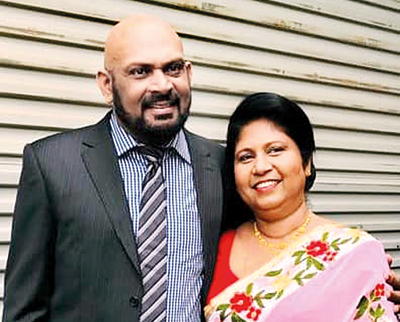News
There was camaraderie in the COVID ward amidst gloom of death and fear of dying

Anuja and Sandya
One of the worst things about lying in a COVID ward is listening to others gasping for air, calling for their love ones and dying while fearing you might be next.
Anuja Carmen Wickramasinghe is a 58-year-old restaurant owner from Boralesgamuwa who was recently released from the Homagama Base Hospital after five days of suffering from COVID. His wife was also infected and stayed ten days. Two of his daughters contracted the virus and received treatment but got off lightly.
“I learned that, however strong and healthy you are, you cannot be sure of your life if you get this disease,” Mr Wickramasinghe said this week. “I saw ailing 80-year-olds get better while young 40-somethings died in front of my eyes.”
“I was scared,” he continued. “What I saw affected me a lot. I understood what death is. These people have nobody near them, no telephones to call home. But when they get worse, they talk in confusion or shout to let out their suffering. That affected me a lot.”
Mr Wickramasinghe said he experienced the deaths of six or seven people. In their final hours, either because they are in discomfort or are confused, many of them pull off their oxygen supply. As the nurses cannot come into the ward all the time–they have to put on a seven-piece PPE each time and take it off on exit–patients in other beds put the masks back on. But sometimes, it is of no use.
“The person next to me died,” he narrated. “The body was on the bed, uncovered, for around five hours. I could not even eat that day. A lot of people don’t have the mask on when they pass away.”
There was an old man in the ward who was sick with other diseases, including diabetes, and paralysis. His son was allowed to stay with him, to feed him, change his diapers and so on. He recovered from COVID and was discharged. Another two kidney patients requiring dialysis also got better.
“But people you won’t imagine will die suddenly get worse and pass away,” Mr Wickramasinghe recounted. “This is why I was so scared. That paralysed man, when he was taken away, didn’t even realize he had been in hospital.”
Mr Wickramasinghe’s wife, Sandya, first experienced symptoms on April 23. The family doctor told her it’s a usual virus and prescribed medicines. The following day, he had a cough and headache so he also got medicine from the doctor who insisted there was nothing to worry about.
By April 30, the medicines had run out but the symptoms hadn’t. The doctor gave medicines again and even cleared them to bathe. But when they returned home, they received a call from an employee of their restaurant saying he had COVID-19. They also had PCRs done and all four tested positive.
The public health inspector said they will notify them of a place to transfer to. In the meantime, they checked the private sector to find all space taken. On April 3, Sandya had severe breathing difficulty and was taken by ambulance to Homagama where the rest of the family was later admitted.
“I wasn’t very ill,” Mr Wickramasinghe said. “There were around 50-60 in my ward with the more critical ones kept separately. But one day, I deteriorated. I couldn’t breathe and my chest was tight. I had to breathe fast and often. They gave me oxygen. Most of us had a bad cough but fever wasn’t a common symptom.”
“I got better that night but the nurse warned me not to be complacent because they had seen many patients who seemed to recover suddenly get worse,” he said. “The intensive care unit has only ten beds. So even if you have contacts, you can’t do a thing until a bed is free.”
The nurses come inside thrice a day–at 5 am, 12 noon and 6 pm. They check pressure and oxygen levels. They don’t usually enter in-between. “And even if someone gets worse, they cannot do anything more if the ICU is full,” Mr Wickramasinghe said. “That seems to be the only option after a certain stage.”
Many patients were transferred from areas like Moneragala, Ampara and Kandy after those hospitals found their conditions were too serious to be treated there.
“There is a lot of cooperation among patients in the ward,” he recalled. “We are friendly and kind towards each other. We check on each other. We take food and water to patients who cannot do it for themselves. I felt sadness on the day I left. I wanted to stay a few more days and care for them. That’s how close we had got.”
One person was particularly helpless, having broken his limbs in a train incident. While in hospital for a month, he contracted COVID and was transferred to Homagama. “I attended to him and he said when I was discharged that there would be nobody to care for him now,” Mr Wickramasinghe said.
While his stay was short, some patients in his ward had been there for three to four weeks. A lot were in the age range of 50-60. Mr Wickramasinghe still feels the effects of the disease, mostly in his throat. The cough also lasted for some days.
“People are not careful enough,” he said, especially after observing how they swarmed out when lockdown was lifted for a day. “They are not careful. I was lucky to have been in a decent hospital. But friends who are in army-run facilities like Punani or Kandakadu say don’t even dream of coming there.”

